Bahçeşehir University (BAU) actively collaborates with local, regional, and national government bodies through expert consultation, joint research, and capacity-building initiatives. The university contributes to evidence-based policymaking by providing analytical insights, academic expertise, and practical solutions that support public institutions in addressing complex social, economic, and environmental challenges.
As part of this mission, BAU engages in outreach, education, and upskilling programs specifically designed for policy- and law-makers. These initiatives cover a broad range of priority areas, including economics, law, governance, migration, technology, and climate change. By integrating academic research with applied learning, BAU strengthens institutional capacities and supports the development of informed, data-driven policies that contribute to sustainable development at both national and local levels.
Through partnerships with ministries, municipalities, and international organizations, Bahçeşehir University ensures that policymakers and public officials benefit from the latest academic knowledge and innovative practices. These collaborative efforts not only enhance public sector competence but also foster transparent, inclusive, and accountable governance, directly advancing SDG 16 (Peace, Justice and Strong Institutions) and SDG 17 (Partnerships for the Goals).
The following examples from the 2023–2024 academic year demonstrate Bahçeşehir University’s active engagement in supporting and strengthening public institutions through education, training, and capacity-building initiatives.
1.BAU Mediation Training for Policymakers under the Ministry of Justice of the Republic of Türkiye
Bahçeşehir University (BAU) is officially authorized by the Ministry of Justice of the Republic of Türkiye to deliver mediation training programs under the Law on Mediation in Civil Disputes.
These programs, which address complex and cross-sectoral issues including energy and healthcare, and environmental law, are designed to enhance the professional capacity of policymakers, legal practitioners, and public officials engaged in conflict resolution and policy development.
Launched in 2021, BAU’s mediation training program has been extended through 2024 by the decision of the Ministry of Justice, following its demonstrated success in upskilling professionals within both the public and private sectors.
The Ministry’s official decision confirming the extension of Bahçeşehir University’s authorization for mediation training through 2024 can be accessed via the image of official correspondence of the Ministry of Justice.

2.Bahçeşehir University Local Governance Academy 2024: A Neutral Platform for Policy Dialogue and Capacity-Building in Sustainable Urban Governance
The image below shows official poster of BAU Local Governance Academy.

For more than two decades, Bahçeşehir University’s International Leadership Practice and Research Center (ULMER) has played a leading role in cultivating future policymakers and public leaders through its Government Leadership School. Established as one of Türkiye’s pioneering university-based leadership development institutions, the School has consistently provided comprehensive education programs, seminars, and projects designed to strengthen the capacity of individuals engaged in governance and public policy.
Building upon this long-standing tradition of excellence, the Local Governance Academy was launched under the Government Leadership School to extend ULMER’s mission to the local level. Recognizing the critical role that municipalities and local authorities play in achieving sustainable development, the Academy focuses on empowering local administrators and policymakers through specialized certification programs.
In 2024, the Local Governance Academy offered structured capacity-building training for municipal personnel, policy practitioners, and individuals aspiring to work in local governance. Its curriculum addresses a wide range of pressing issues, including urbanization and smart cities, digital transformation in public administration, migration and refugee management, environmental sustainability, and climate-resilient urban planning.
The program also aims to enhance the analytical and decision-making skills of participants, helping them adapt to the complex realities of modern urban governance. Through interactive sessions, case-based discussions, and applied learning modules, the Academy fosters a culture of participatory, inclusive, and data-driven policymaking.
The Academy represents an important example of education and capacity-building for policymakers, empowering local government representatives with knowledge and skills in sustainable urban management, social participation, disaster recovery, and environmental resilience.
Participants included nine mayors from different municipalities across Türkiye, representing both metropolitan and regional administrations: Beşiktaş, Üsküdar, Avcılar, Beylikdüzü, Bağcılar, Fatih, Altınordu, Payas, and Onikişubat. In addition, senior public officials, such as Refik Tuzcuoğlu, Deputy Minister of the Ministry of Environment, Urbanization and Climate Change, participated alongside academics from Bahçeşehir University and other institutions, including Prof. Dr. Esra Hatipoğlu, Prof. Dr. Esra Albayrakioğlu, and Prof. Dr. Ebru Canan-Sokullu.
Bringing together leaders from different political parties and diverse professional backgrounds, the Local Governance Academy exemplified Bahçeşehir University’s commitment to serving as a neutral, inclusive platform for constructive dialogue. Through its academic expertise and nonpartisan engagement, BAU facilitates knowledge-sharing and cooperation between academia, local governments, and national institutions, contributing to evidence-based policymaking and good governance practices.
Through this initiative, Bahçeşehir University continues to advance SDG 11 (Sustainable Cities and Communities), SDG 13 (Climate Action), and SDG 16 (Peace, Justice and Strong Institutions) by linking research, training, and practical policy development for inclusive and sustainable local governance.
The images below shows content of the program and the highlights pictures of BAU Local Governance Academy.
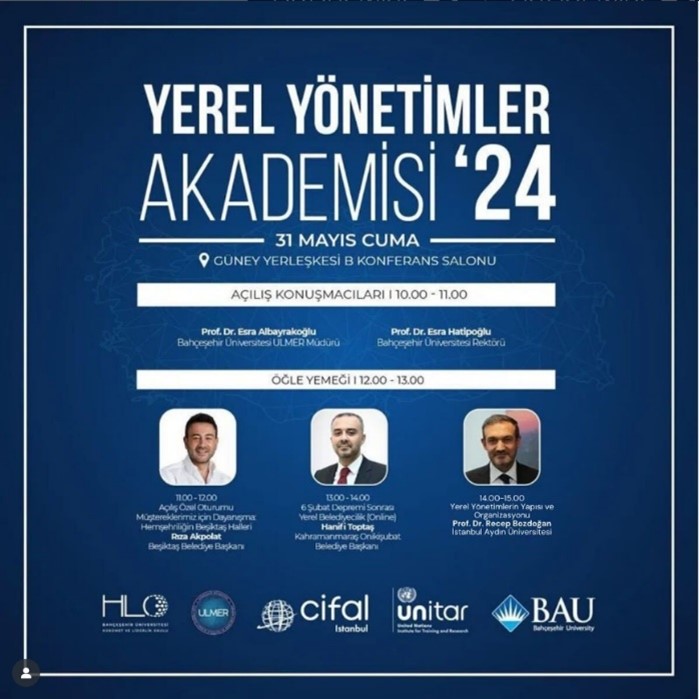
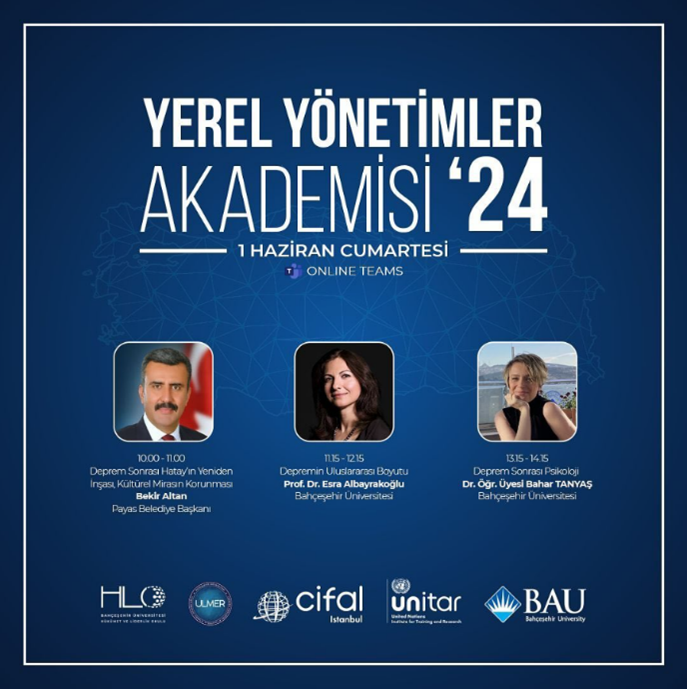
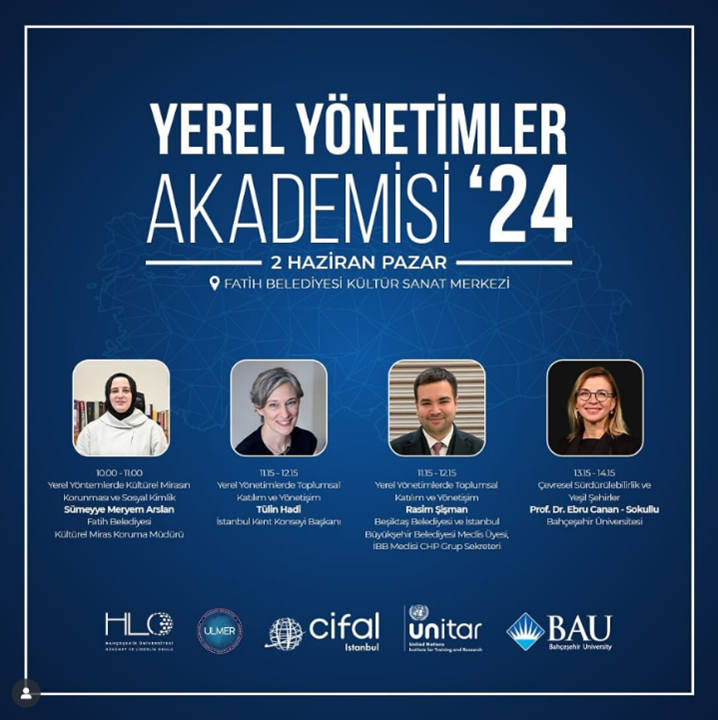
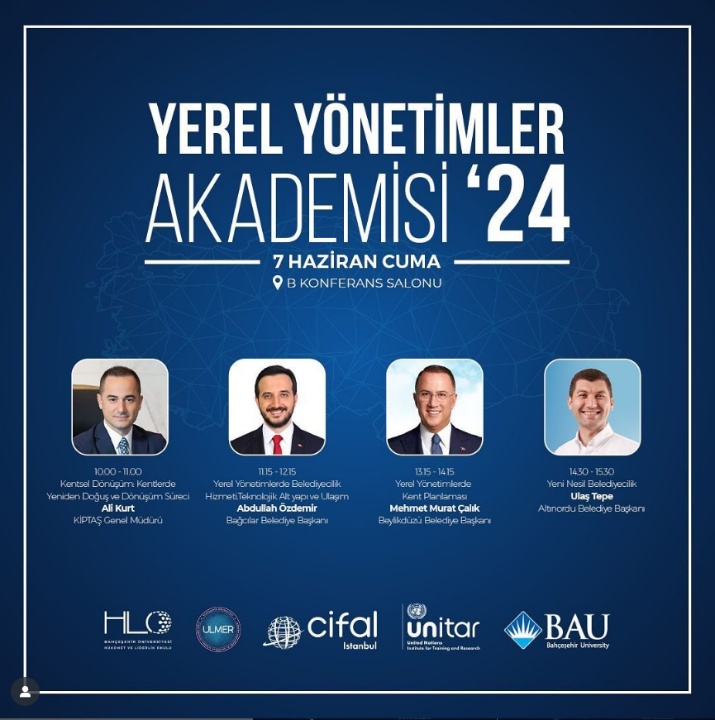

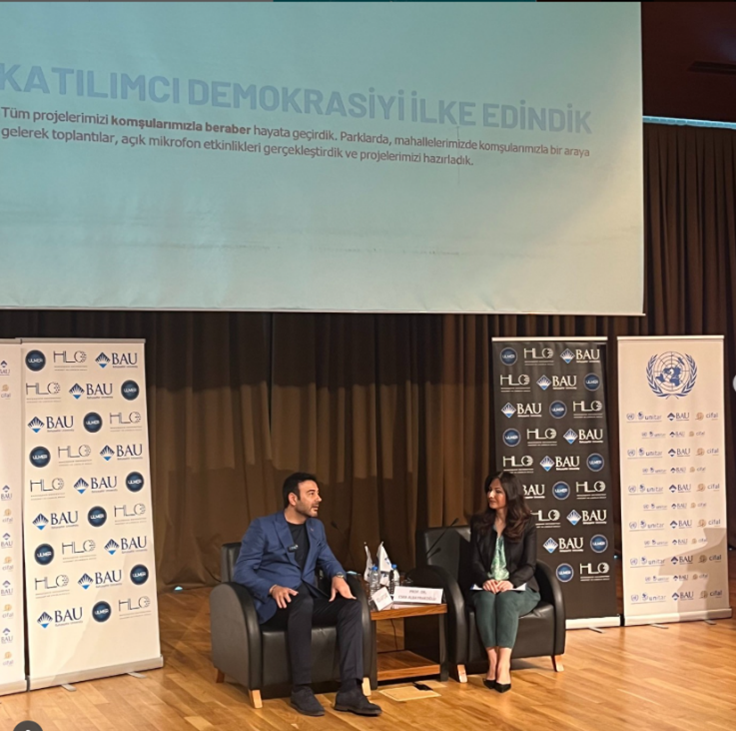
3.BAU Diplomat School – A Neutral Platform for Global Dialogue and Capacity Building includes Climate and Energy
The image below shows official poster and content of BAU Diplomat School.
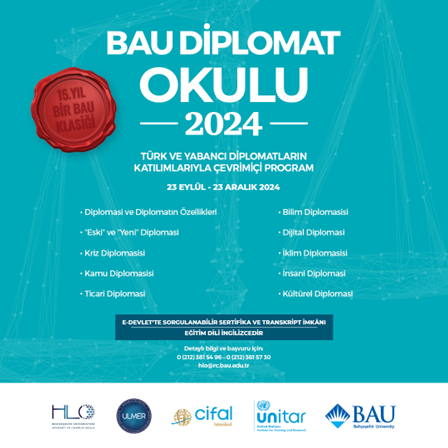
Bahçeşehir University’s International Leadership Practice and Research Center (ULMER), under the Government Leadership School, organizes the BAU Diplomat School, a pioneering initiative designed to enhance the capacity and understanding of policymakers, diplomats, and public officials on global developments and challenges.
Celebrating its 15th year in 2024, the program continues to provide a neutral, academically guided, and inclusive platform where individuals from different political backgrounds and professional experiences come together to engage in open and constructive dialogue.
Over the years, the BAU Diplomat School has hosted a wide range of distinguished figures, including ministers, ambassadors, members of parliament, senior bureaucrats, policy advisors, thought leaders, and veteran academics — individuals who play key roles in shaping Turkey’s and the world’s diplomatic and foreign policy agendas.
It remains one of the few academic platforms in Turkey where diverse perspectives, ideologies, and political identities meet under the same roof to discuss complex issues in an impartial and academically safe environment.
As a comprehensive, long-standing, and non-partisan educational initiative, the BAU Diplomat School has become a model for how universities can contribute to public policy dialogue, capacity building, and global cooperation.
In 2024, the Diplomat School program runs online between 23 September and 23 December 2024, maintaining its 14-week structure with sessions held every Monday from 08:30 to 11:30..
The 2024 curriculum has been comprehensively updated to address both classical and emerging dimensions of diplomacy, featuring modules on:
Climate and Energy Diplomacy
Humanitarian and Cultural Diplomacy
Diplomacy and the Characteristics of a Diplomat
“Old” and “New” Diplomacy
Crisis Diplomacy
Public and Commercial Diplomacy
Science and Digital Diplomacy
The Diplomat School directly contributes to SDG 16 (Peace, Justice and Strong Institutions) and SDG 17 (Partnerships for the Goals) by strengthening the link between education, diplomacy, and sustainable governance.
4.BAU and Marmara Municipalities Union: Policy Dialogue and Capacity-Building for Sustainable Urban Development: BAU 7th Local Advocacy School
The image below shows official poster and content of 7th Local Advocacy School.
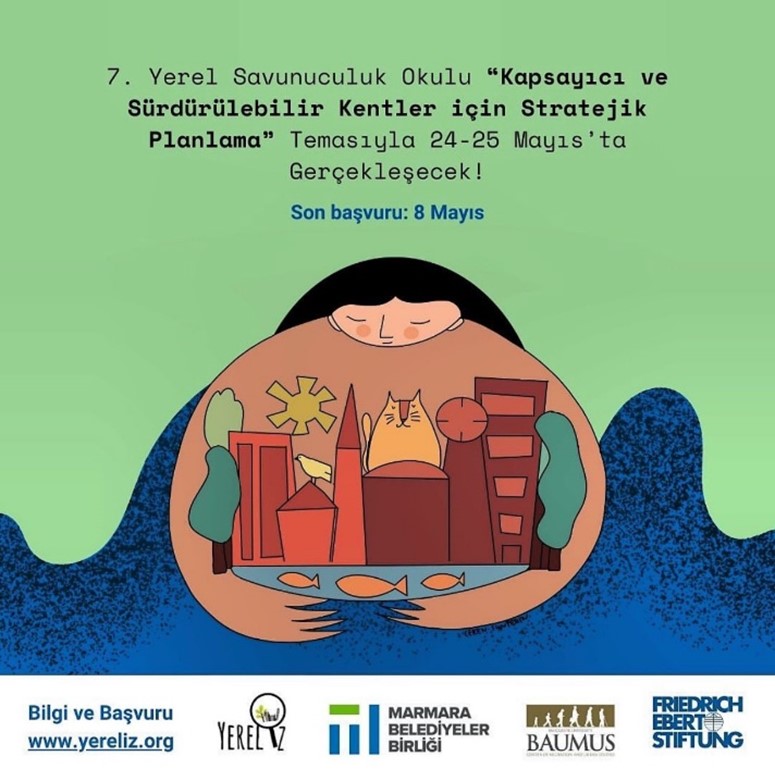
On 24–25 May 2024, Bahçeşehir University’s Center for Urban Studies (BAUMUS), in collaboration with the Marmara Municipalities Union (MMU) and the Association for Local Monitoring, Research and Implementation (YERELİZ), and with the support of the Friedrich Ebert Stiftung Turkey Office, organized the 7th Local Advocacy School.
The two-day training program was designed to build the capacity of local government professionals and policymakers from across the Istanbul metropolitan region, equipping them with the skills and knowledge required for participatory and sustainable strategic planning.
Held on the first day at the Marmara Municipalities Union headquarters and on the second day at Bahçeşehir University’s Beşiktaş Campus, the program focused on strengthening municipal teams during Türkiye’s post-election strategic planning period.
Participants explored how to develop inclusive, data-driven, and SDG-aligned local strategies that respond to urban challenges such as climate adaptation, social policy, and equitable resource allocation.
The training covered the structure of municipal systems, roles of local actors, and the functions and methodologies of strategic planning. The 2024 edition also featured focused sessions on local economic resilience and digital transformation, emphasizing how municipalities can integrate innovation and technology into sustainable governance practices.
Modules included sessions on participatory governance, local advocacy, and integration of Sustainable Development Goals into local policy frameworks.
The program concluded with a hands-on strategic planning exercise, where municipal representatives collaborated to design sample strategic plans reflecting both global indicators and local priorities.
Now in its seventh iteration, the Local Advocacy School has become a model for capacity-building and outreach education among local governments in Türkiye.
By fostering cooperation between universities, municipalities, and civil society organizations, the initiative serves as a neutral and inclusive platform that empowers local policymakers to design sustainable urban policies.
Through this program, Bahçeşehir University contributes directly to Sustainable Development Goal 11 (Sustainable Cities and Communities), Goal 16 (Peace, Justice and Strong Institutions), and Goal 17 (Partnerships for the Goals) by strengthening local governance, promoting transparency, and advancing collaborative, evidence-based policymaking.
https://projematik.ikg.gov.tr/miswebsite/AS_HaberFrame.aspx?haberID=1334605
5.BAU Global Leadership Forum: Evolution of the International System, Global Peace and Security
The images below show highlight pictures of BAU Global Leadership Forum.
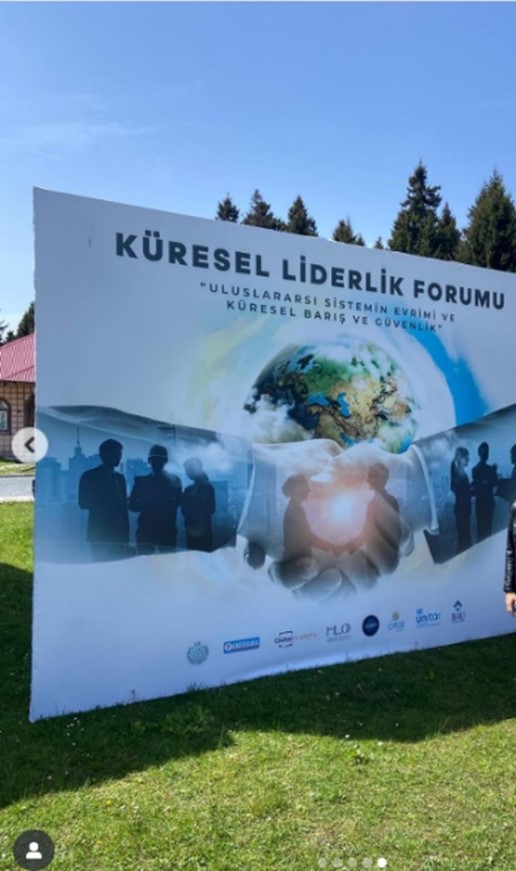
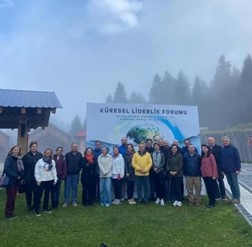
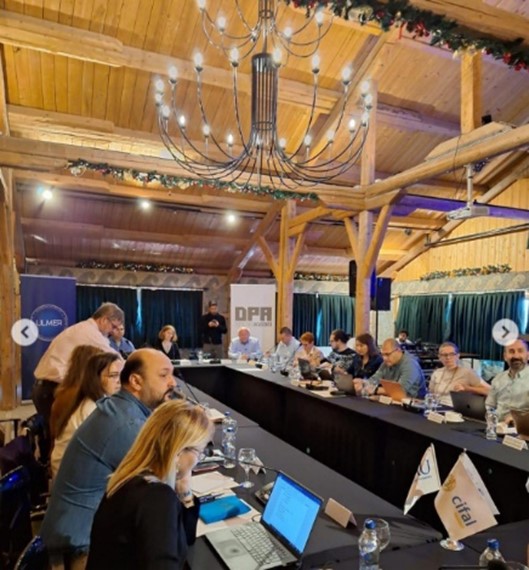
On 27 May 2024, Bahçeşehir University’s International Leadership Practice and Research Center (ULMER) and the Government and Leadership School (HLO), in cooperation with Global Akademi, organized the Global Leadership Forum under the theme “The Evolution of the International System and Global Peace and Security.”
The forum was held in Giresun Kulakkaya Plateau with the support of the Council on International Relations (UİK), Panorama Portal, and the United Nations Institute for Training and Research (UNITAR) CIFAL Istanbul.
The event brought together policymakers, local government representatives, academics, diplomats, and experts from diverse institutional and political backgrounds to discuss the structural transformations of the international system and the actors and processes challenging global peace.
It also served as a neutral, interdisciplinary platform that encouraged open dialogue and collaborative reflection on global governance, conflict resolution, and sustainable peace.
The 2024 edition — organized for the second consecutive year in partnership between BAU ULMER and Global Akademi — opened with the discussion of a policy report authored by Prof. Evren Balta and Assoc. Prof. Soli Özel, titled “Power Shifts and Insights for Understanding the New International Order.”
Sessions explored critical global issues such as the crisis of Western-led globalization, asymmetric multipolarity, post-Western order, geopolitical instability, and the strategic position of the Global South.
Participants examined how recent conflicts, including the Ukraine and Gaza wars, have reshaped international norms, and discussed the intersection of the climate crisis with global security, institutional fragility, and the erosion of rule-based governance.
Throughout the forum, BAU faculty members provided academic guidance and led training-oriented sessions for public officials and policy practitioners, enhancing their analytical and strategic capacities on topics such as global governance, sustainability, and international cooperation.
By engaging different institutional actors in a shared learning environment, the forum contributed to the development of informed, globally minded decision-makers.
Through this initiative, Bahçeşehir University strengthens its role as a bridge between academia and policy, fostering evidence-based dialogue and collaboration across political and institutional lines.
The Global Leadership Forum directly advances Sustainable Development Goal 16 (Peace, Justice and Strong Institutions) and Goal 17 (Partnerships for the Goals) by promoting inclusive discussion, institutional cooperation, and knowledge exchange among policymakers and scholars addressing today’s complex global challenges.
6.BAU Capacity-Building Roundtable with the Deputy Minister of Labour and Government Officials on Gender Equality in Technology (19.04.2024)
The images below show the pictures of Deputy Minister of Labour and BAU members’ roundtable meeting.
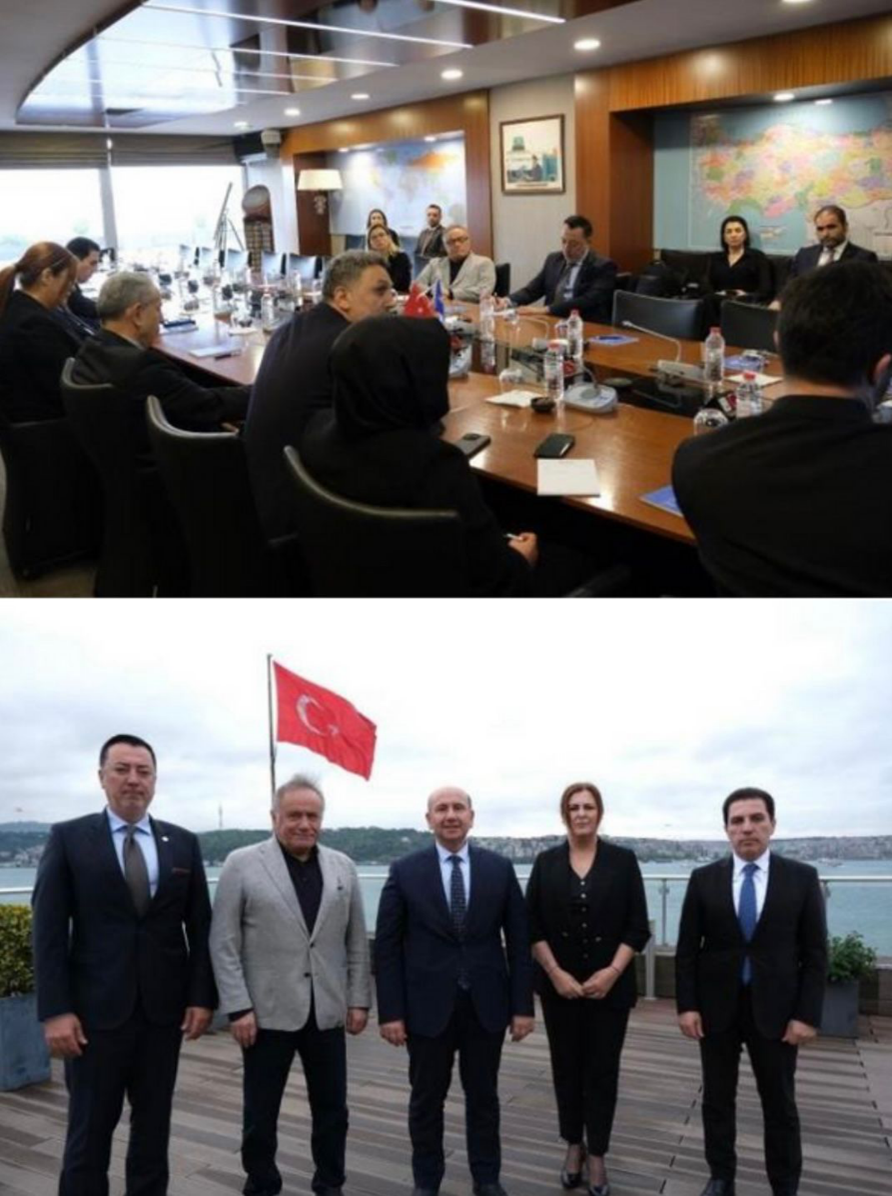
On April 19, 2024, Bahçeşehir University organized a capacity-building roundtable with Prof. Dr. Lütfihak Alpkan, Deputy Minister of Labour and Social Security, and other senior government officials to discuss gender equality, inclusion, and equal opportunity in technology and digital transformation. The event brought together policymakers, academics, and industry representatives to exchange views on promoting women’s participation in technology-driven sectors and ensuring equal representation in the digital workforce.
During the session, BAU academics shared research-based analyses and policy recommendations focusing on strategies to enhance women’s access to STEM education, leadership in innovation ecosystems, and participation in emerging technology industries. The discussions emphasized the importance of building inclusive digital economies and sustainable employment opportunities that empower all individuals to benefit from technological progress.
This initiative advanced SDG 5 (Gender Equality), SDG 8 (Decent Work and Economic Growth), and SDG 16 (Peace, Justice and Strong Institutions) by fostering dialogue between academia and public institutions, supporting evidence-based policymaking, and strengthening institutional cooperation for equitable and sustainable digital development.
7.BAU Politics & Society Seminar Series – “Bridging Justice and Gender: Analyzing Organizational Dynamics in Istanbul’s Local Governance through Studying Up and Scorecard Analysis”
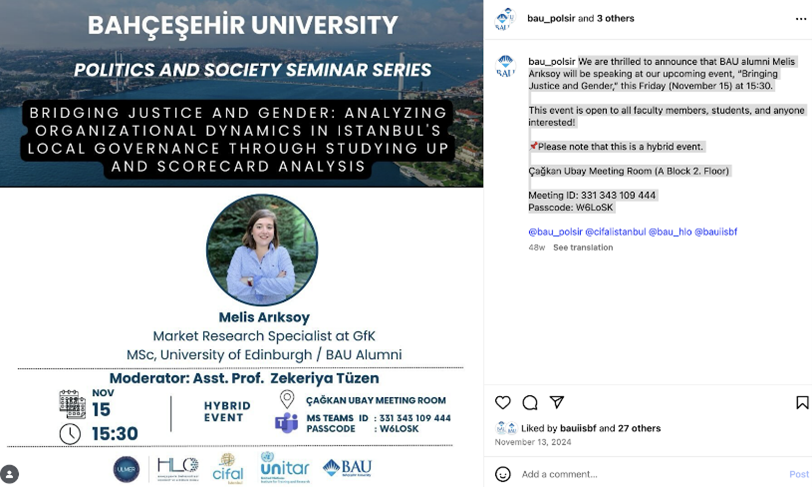
Bahçeşehir University (BAU) hosted a session within its Politics & Society Seminar Series titled “Bridging Justice and Gender: Analyzing Organizational Dynamics in Istanbul’s Local Governance through Studying Up and Scorecard Analysis.”
Presented by BAU alumna Melis Arıksoy, the seminar explored the intersection of justice, gender, and institutional accountability within Istanbul’s municipal governance structures.
Drawing on her professional experience as a research specialist, Arıksoy examined organizational hierarchies, power relations, and evaluation mechanisms in local governments through a gender-sensitive and data-driven lens.
She highlighted how tools such as gender scorecards and performance assessments can help municipalities identify inequities, improve institutional transparency, and promote fairness in public service delivery.
The session was attended by representatives of local governments, policymakers, and BAU faculty members, providing a neutral academic space for discussing how gender equality can be integrated into governance practices.
The seminar contributed to the awareness and capacity-building of municipal decision-makers by introducing actionable frameworks for gender-responsive planning, evaluation, and accountability in local administrations.
Through this initiative, Bahçeşehir University strengthened its outreach and engagement with local policymakers, supporting Sustainable Development Goal 5 (Gender Equality), Goal 16 (Peace, Justice and Strong Institutions), and Goal 11 (Sustainable Cities and Communities) by promoting inclusive, transparent, and equitable governance at the local level.
8.BAU Team’s Visit and Training Program to the Earthquake Zone Municipalities in Malatya
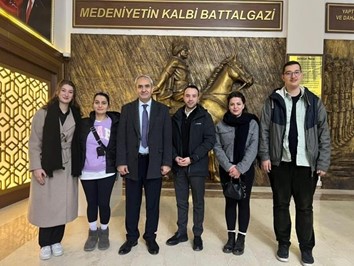
On 13 December, the Bahçeşehir University’s CIFAL Istanbul, UNITAR team organized a meaningful educational event in Battalgazi, Malatya titled “Heroes of Nature: Raising Awareness on Sustainability,”.
During the seminar, CIFAL Istanbul personnel introduced participants to the mission and values of the United Nations, explaining how individuals can actively contribute to achieving the Sustainable Development Goals (SDGs). The speakers addressed key topics such as clean water conservation, renewable energy, sustainable cities, climate action, and the protection of natural ecosystems. Presentations focused particularly on waste reduction and the long-term benefits of adopting eco-friendly lifestyles within families and communities. The initiative reflected Bahçeşehir University’s dedication to providing quality education beyond its own campus, extending academic expertise to external learning environments.
The following day, on 15 December, the BAU CIFAL Istanbul team, held a series of official meetings with local authorities in Malatya, one of the provinces most affected by the earthquakes of February 6. The delegation first met with the Head of the Strategy Development Department at the Malatya Metropolitan Municipality, where discussions focused on possible improvements in the region, including the sustainable reconstruction of schools, educational initiatives, and potential collaborations to enhance the quality of learning in the area. Later, the team visited the Deputy Mayor of Battalgazi Municipality to exchange views on the city’s recovery efforts, social service delivery, and evolving community needs. Both meetings aimed to identify areas for cooperation that align with the principles of Sustainable Development Goal 16: Peace, Justice and Strong Institutions, emphasizing transparent governance, institutional resilience, and inclusive local partnerships.
By engaging directly with local administrations and delivering educational activities on-site, Bahçeşehir University and CIFAL Istanbul continues to expand the social impact of higher education — supporting sustainable recovery and promoting quality learning opportunities in regions most in need.
9.BAU Provides Capacity-Building Programs for Policy and Law Makers in Cooperation with the Ministry of Justice
Bahçeşehir University provides outreach, professional education, and capacity-building programs for government bodies, policymakers, and legal experts in cooperation with the Ministry of Justice of the Republic of Türkiye.
In 2023, the University was officially authorized by the Directorate General for Legal Affairs – Department of Expertise (Bilirkişilik Daire Başkanlığı) to deliver the Basic Training for Concordat Commissioners, a government-approved program aimed at strengthening institutional and legal capacity within the national judicial framework.
This authorization was granted for a three-year period, confirming the University’s sustained role as a trusted academic partner of the Ministry in legal and policy-oriented education.
Through this collaboration, Bahçeşehir University supports the Ministry of Justice in developing evidence-based policies, improving legal literacy, and enhancing the professional qualifications of experts involved in commercial, economic, and bankruptcy law.
The initiative reflects the University’s ongoing contribution to policy design and implementation processes through academic expertise and structured training.
This partnership underscores Bahçeşehir University’s commitment to SDG 16 – Peace, Justice and Strong Institutions, by providing knowledge transfer and capacity-building programs that directly support government agencies, policymakers, and justice-sector professionals in advancing good governance and institutional integrity.
The related official correspondence from the Ministry of Justice can be accessed through the link provided below.
Click for the link.
10.Strengthening Education through Collaboration: Bahçeşehir University Partners with the Ministry of Education
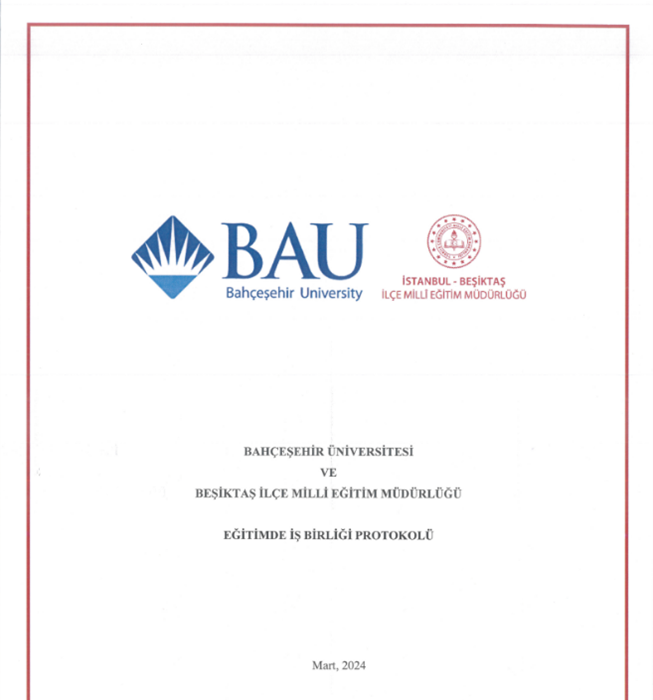
Bahçeşehir University signed a cooperation protocol with the Beşiktaş District Directorate of National Education, which operates under the Ministry of National Education of the Republic of Türkiye. Under this protocol, BAU will serve as a “trainer of trainers,” providing educational programs and academic support for instructors affiliated with the Ministry, focusing on strengthening professional capacity, promoting innovation, and improving educational practices.
11.Bahçeşehir University and the Ministry of Industry and Technology Continue Strategic Partnership for Türkiye’s Technological Future
The images below show the cover page of Ministry of Industry and Technology and BAU partnership agreement.
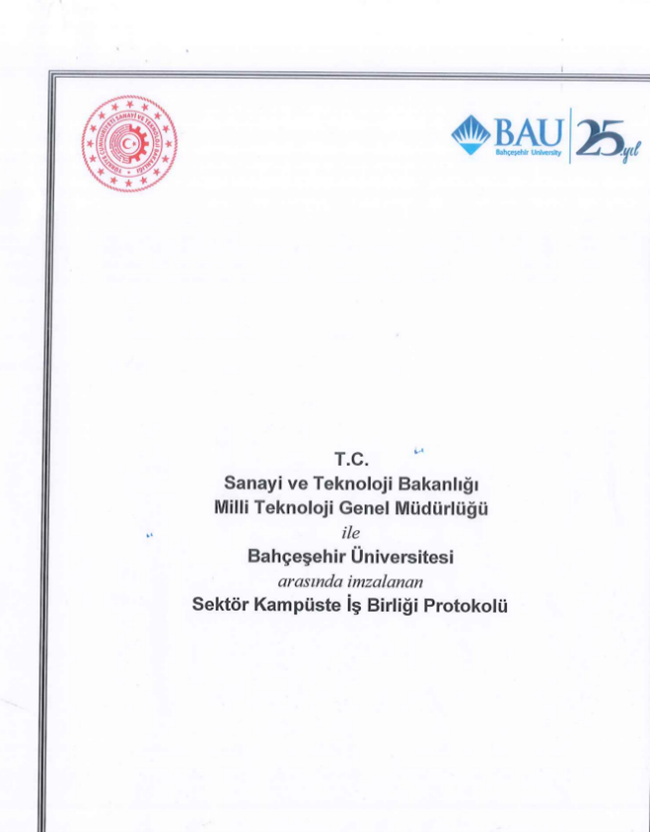
In 2023-2024 academic year, a cooperation protocol was signed between Bahçeşehir University and the Directorate General of National Technology of the Ministry of Industry and Technology of the Republic of Turkey to train and develop human resources. The protocol builds on and strengthens the ongoing collaboration between the two institutions, aiming to foster innovation, support national technology initiatives, and cultivate highly skilled professionals for Türkiye’s future. This cooperation continues actively.